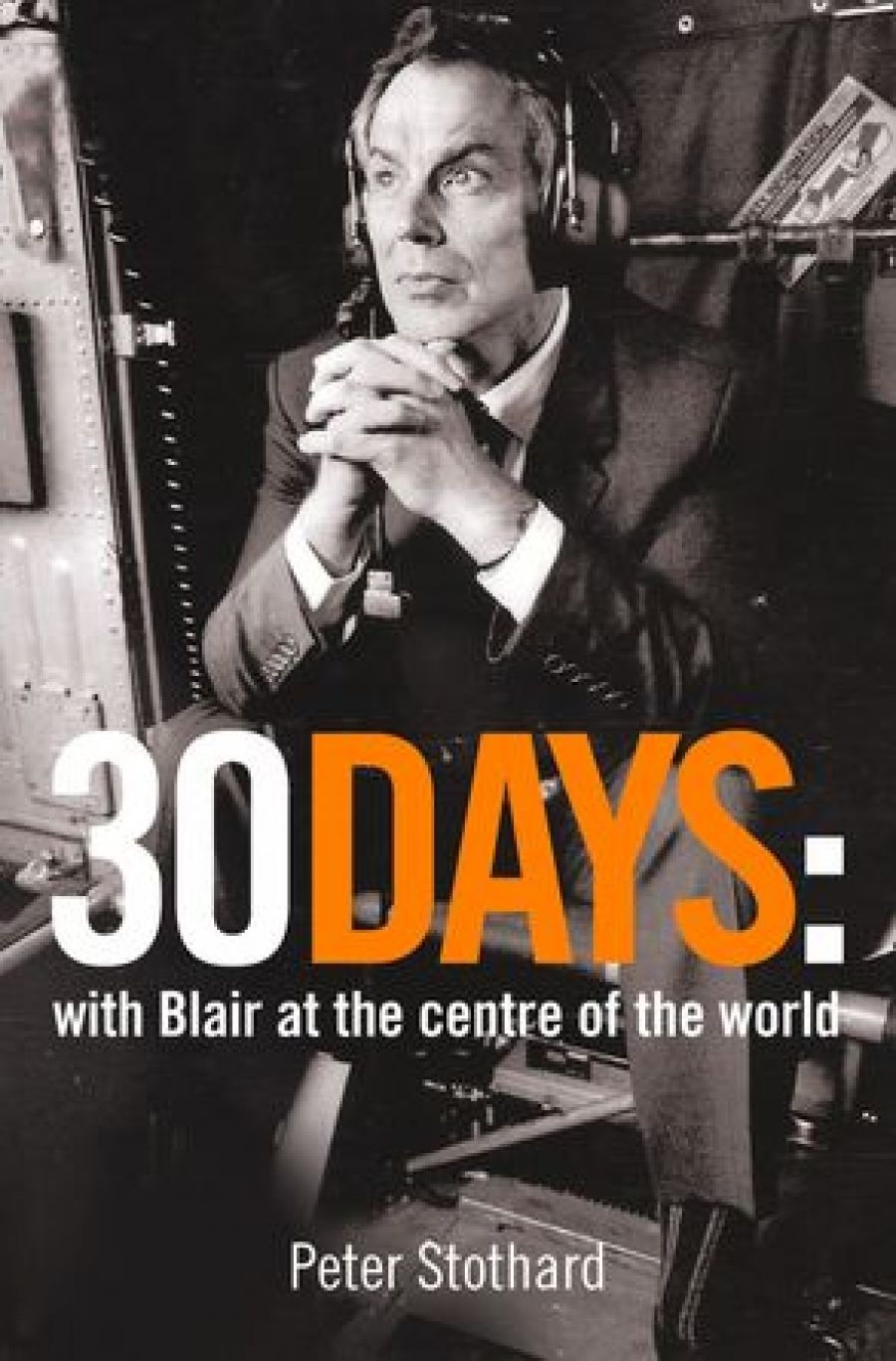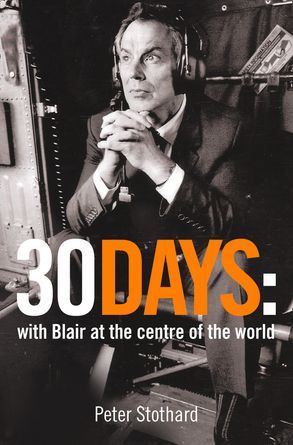
- Free Article: No
- Contents Category: Politics
- Review Article: Yes
- Article Title: Wagon Wheels
- Online Only: No
- Custom Highlight Text:
This book is as beguilingly English as a Fortnum & Mason picnic hamper. Peter Stothard (a former editor of The Times and current editor of the Times Literary Supplement) spent a month inside 10 Downing Street reporting in intimate detail the comings and goings there during the critical days before and after the Coalition of the Willing began its assault on Iraq on March 20 this year. He evokes a life-size doll’s house from which a war is being waged by perplexed adults in suits and jeans, who pick spasmodically at substandard food, fantasise about fitness régimes and support spectacularly unsuccessful soccer teams. The man in charge lives in a flat above this strange enterprise with the rest of his family.
- Book 1 Title: 30 Days
- Book 1 Subtitle: A month at the heart of Blair’s war
- Book 1 Biblio: HarperCollins, $24.95 pb, 244 pp
- Book 1 Cover Small (400 x 600):

- Book 1 Cover (800 x 1200):

Number 10 Downing Street, the place, almost upstages its inhabitants. It is a rabbit warren of Regency-striped corridors dotted with grandfather clocks, armoires and busts of old prime ministers, and decorated exactly as you ‘would expect in a prosperous house inhabited by people who do not care much for art’. It teems with messengers and caterers and security people and cabinet ministers (at least one of whom is a baroness). At weekends, the pollies who have risen from the working-class wear their best clobber (which may include a pink shirt and a maroon tie); the middle-class types wear cashmere and smart casual; the public-school toffs (including the PM) wear jeans. The head of MI6 wears very old jeans indeed.
Improbably, as war looms, ‘a schoolmasterly man in a salt-and-pepper tweed suit and breakfast-stained tie’ arrives, as he does every Wednesday, to hand-wind all the grandfather clocks. And the carpet-layers are in, but, would you believe, after they’ve completed their handiwork it’s discovered that the handsome new carpet is narrower than it was meant to be, and they are going to have to come back next week. Even more improbably, somewhere above the Cabinet Room and the work places for the PM and his senior civil servants, Cherie Blair is raising three of her four children. Three-year-old Leo Blair has his train set running through the corridors of power. At one stage, he wanders around unsupervised, bestowing chocolate Wagon Wheels, even leaving one on his father’s desk. You almost expect Cherie to lean over the balustrade in her housecoat and yell to her husband that his dinner is on the table and getting cold.
Numbers 10 and 11 Downing Street, as seen from outside, are of course a façade. Behind their reassuring homeliness, George II’s wily confidant Sir Robert Walpole created vast interconnecting spaces centuries ago. It is part home, part office and, during 30 Days, part prison. Off-stage, there is the constant thunder of demonstrators; during one critical conversation with the President of Chile, Blair has to apologise for all the noise outside and has difficulty in hearing. He and his colleagues are under siege.
But this narrative, with its tantalising and colourful details, is punctuated by a great mystery, a subtle intrigue and important intellectual issues.
The mystery is why it is that Blair, who was once a political and personal friend of Bill Clinton (with whom he shared similar student experiences at Oxford University and similar ideas about how traditional left-wing activists and voters might be persuaded to embrace new, less collectivist policies), has become a latter-day pal of George W. Bush and those spurious men of the European right, Spain’s José Maria Aznar and Italy’s Silvio Berlusconi.
The intrigue sounds vaguely familiar to an Australian readership. Before Labour’s previous leader, John Smith, died in 1994, Blair and George Brown were friends and the rising stars in the party. Brown was more senior, intellectual and passionate, but he was persuaded not to contest the leadership, on the basis that, if he accepted the unchallenged ascension by the more electorally attractive Blair and ran Treasury for a while instead, he would one day become prime minister in the not-too-distant future. That day now seems a long way off, but the strength of Brown’s commitment to the Iraq War remains as one of the many enigmas wrapped up in a riddle in this gripping yarn.
This is British politics at its best and its most attractive, for there is real substance to the issues at hand and to the analysis that runs like Alph, Coleridge’s mysterious subterranean river, through these pages. Stothard attempts to assemble from all that he has heard and seen the most plausible rationale for Blair’s position.
Yes, there is a genuine religious fervour shared by Bush and Blair, although fortunately the Brit, unlike his trans-Atlantic counterpart, does not begin his Cabinet meetings with a prayer. But beyond religion, there is realpolitik. Blair perceived that, in the wake of September 11, it was inevitable that the US would move against Saddam Hussein. Just as Winston Churchill and Harold Macmillan deluded themselves into believing that they had brought a mollifying influence to bear on, respectively, Franklin D. Roosevelt during World War II and on John F. Kennedy during the Cuban Crisis, Blair took the view that it was in his country’s and the world’s best interests to stand as a friend beside Bush rather than allow the US president to proceed without one major power as his ally. Blair believed that the UN Security Council would in the end support the war if they, like him, could see how determined Bush was; but he was wrong. Blair thought that military victory would be quick and without significant casualties, in which he was only half right. One of the important threads in this book is the slow dawning on the British team that their view of the UN’s vital role in post-war Iraq was not shared by Washington.
Stothard writes with enormous verve, vividly catching the mood of these historic days. At one stage, during a Brussels stopover, Jacques Chirac has Blair backed up against a wall in an ill-lit basement corridor in private conversation. The moment is captured in one of the splendid photographs that embellish this book. Stothard observes dryly: ‘[I]t looks like the meeting of a gangster with a man who owes him money.’
Stothard is in his element during the set-piece stopover at Camp David, the military-agrarian complex whose faux log cabins are the Maryland equivalent of the faux Downing Streetscape. George is at Aspen cabin; Tony is at Dogwood. Laurel cabin, where the rest of the British team is based, is planked, brick-patched, with a woodpecker perching cutely by the chimney, but inside is a place from which a modern war may be waged with impunity.
Back in London, deep in the bowels of Number 10 is Room 218, the so-called Old War Office Room, a bunker that gets fresh air and usage only about twice a decade; it is equipped with state-of-the-art technology, too, but also compressed-air communication tubes. Around the walls are framed letters from people such as David Owen, Labour’s dashing young foreign secretary of 1978, thanking staff for their efforts during the Congo crisis, and from Maggie Thatcher congratulating them all for their contribution to the Falklands victory in 1982 and the Yemen civil war in 1986. Of all the emergencies eulogised in this underground cavern, Stothard observes soberly, only the South Atlantic conflict has so far ended in peace.
Somehow, in the middle of the Iraq crisis, we find Blair holding intermittent meetings with Gerry Adams and Martin McGuinness about the latest road hump on their own circuitous map to peace. He has probably spent more of his prime ministerial time on Northern Ireland than on any other international issue, but the intractability of this issue does not seem to dent his supreme optimism about the Middle East, where the religious divisions are deeper, the local participants less easily knowable and his persuasive reasonableness compromised by his partnership with an inflexible mega-power.
Unlike Bob Woodward in Bush at War (2002), the best-selling account of the US administration in the wake of September 11, Stothard has been able to bring his extraordinary cast to life. He has conjured up a hyperkinetic world of long hours and little sleep, bad food and failing health, restless travel and incessant badinage, in which there is simply too little time to step back even for a moment to ponder whether they are all rushing headlong down the wrong corridor of history.


Comments powered by CComment